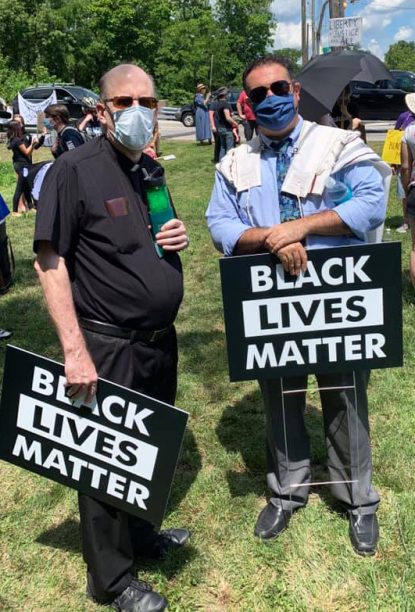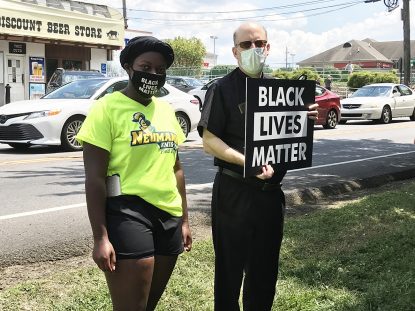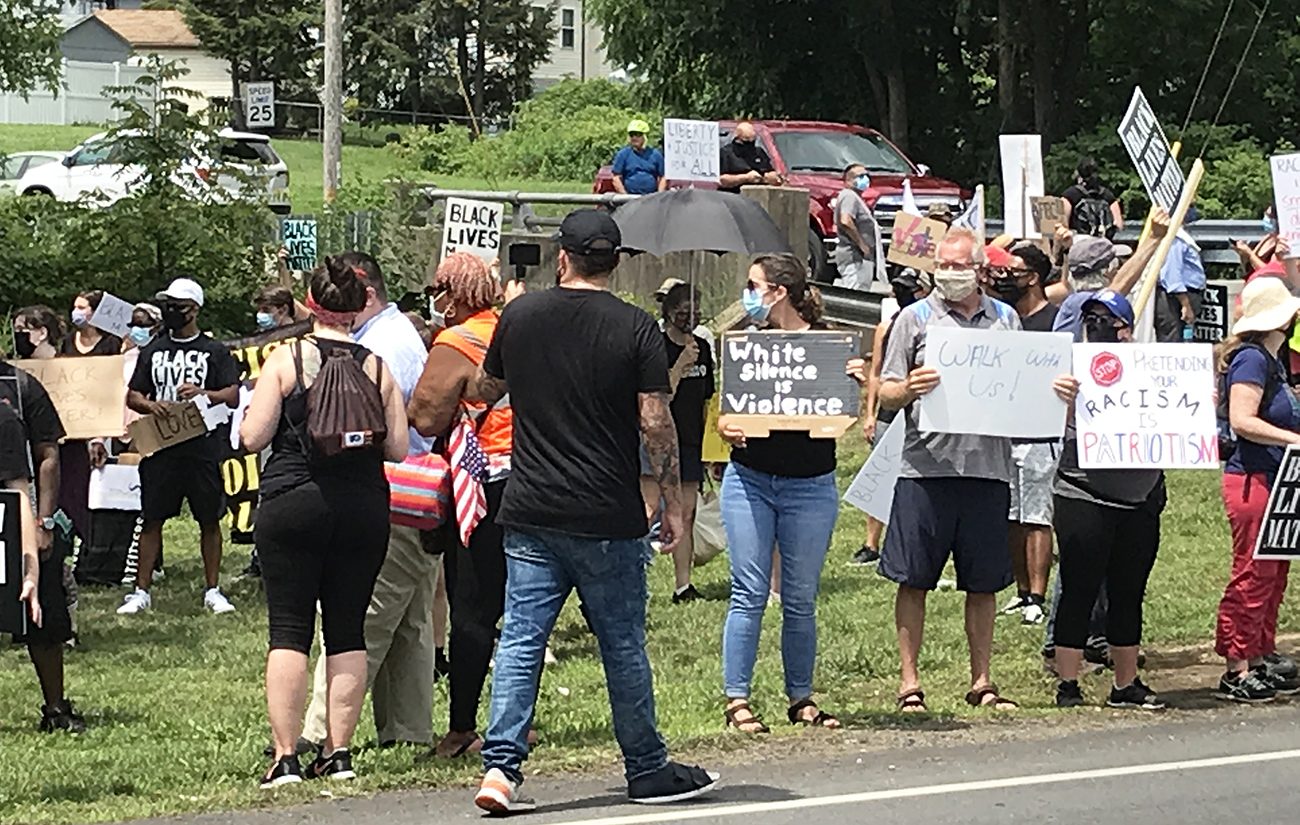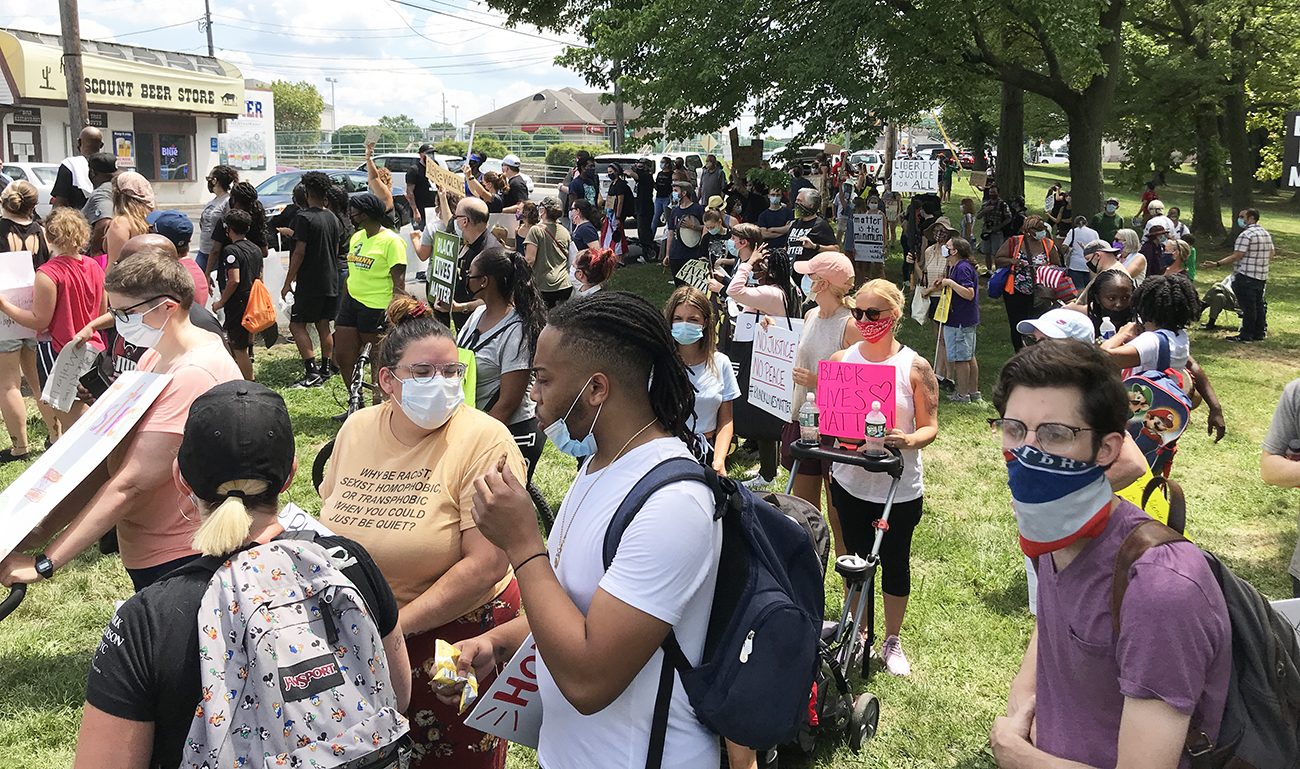As demonstrations for racial justice and healing continue to roil the nation, faith leaders are increasingly joining the fray in solidarity with protesters.
In kippahs, tallitot and clerical collars, these faith leaders are stepping in to bear witness to the evil of racism in all its forms.
Their latest stand came last Saturday, Aug. 1 when Catholic, Jewish, Methodist, Quaker and Episcopalian leaders of the Interfaith Council of Southern Delaware County joined Delco Resists in a Black Lives Matter rally and march in Ridley Township.
(See scenes from the rally in our Photo Features section.)
[hotblock]
“Racial equity is an issue of how I view God,” said Rev. Lydia Muñoz, of Swarthmore United Methodist Church, who attended. “If I believe that we are all made in the image of God, then my view of others and my treatment of others directly impacts how I view and what I believe about God.
“If I believe that God looks like a white … Christian male, then I will treat everyone who does not fit that description as inferior and less than God’s image.”
For more than two hours before the march to the Ridley Police Station began, the faith leaders and some congregants joined the crowd of about 200 – Black and White, some in strollers and some gray haired, all in masks – as they listened to speakers, registered voters and connected over the need for cultural, moral and political change.
“At the core, I think every religion teaches love and compassion,” said Rabbi Jeremy Gerber of Congregation Ohev Shalom in Wallingford. “We may then veer off in different directions, but the core message is – and must remain – love, kindness, compassion and acceptance. Rallying and speaking out for this kind of issue feels like praying and worshiping with our entire beings.”

Interfaith leaders at the rally included Father Ed Hallinan, pastor of St. John Chrysostom Parish in Wallingford, and Rabbi Jeremy Gerber, of Congregation Ohev Shalom in Wallingford. (Photo courtesy State Sen. Tim Kearney)
Speaker after speaker reminded the crowd that Black Lives Matter is a nonviolent movement, and the attendees agreed, limiting their actions to waving signs (“No justice, no peace,” “Silence is violence,” “Say their names” and “I can’t believe I still have to protest this stuff”) and chanting (“Black lives matter!” and “If all lives matter, help us prove it!”).
‘Hate is alive and well’
Gathered on the other side of Frederick L. Mann Park were counter-protesters, including scores of motorcyclists, under large American and Confederate flags. As the BLM crowd lined the streets with signs, the bikers circled the block, cursing and making obscene gestures, revving their engines to drown out the crowd and spewing black smoke along the line.
“Hate is still unfortunately alive and well,” said Father Ed Hallinan, pastor of St. John Chrysostom Parish in Wallingford, as he spoke later to Catholic faithful at the parish in a talk after Communion. He was the only Catholic priest to attend Saturday’s rally.
“The hate was there,” Father Hallinan said. “But what was also there, in these young Black and White folks that were there, was there didn’t seem to be any retaliation of spirit. It seemed to be a very loving and peaceful group, and I admire them for remaining that way in the face of opposition and hate.”
Several protesters came up and introduced themselves as members of other faiths or other Catholic parishes, he said.
[tower]
Other Interfaith Council representatives included Dr. William Oberfield of Providence Friends Meeting in Media and Rev. Jessie Thompson of St. James Episcopal and St. John the Evangelist Episcopal Churches in Delaware County.
Dr. Kevin Hughes, a professor of historical theology at Villanova University, held a sign reading “We will not be silent” alongside his daughter Rachel, a student at the University of Notre Dame.
State Sen. Tim Kearney, a Democrat whose district includes 18 Delco communities, told the crowd he would soon introduce a “Breonna’s Bill” in Harrisburg to outlaw no-knock search warrants.
The legislation, which is growing nationwide, is named for Breonna Taylor of Louisville, Kentucky, a 26-year-old African American woman and emergency medical technician who was shot to death in March by plainclothes police officers who entered her apartment unannounced at midnight to execute a search warrant.
Kearney, a self-described “old white guy,” said the bill and the rally were just two steps in a long struggle “do what we can do for our Black brothers and sisters.”

Gabby Wilson of Sharon Hill, a junior at Neumann University, meets Father Ed Hallinan, pastor of St. John Chrysostom Parish, at the rally.
Hands across parishes
That struggle has gained traction at St. John Chrysostom in Wallingford and St. Martin de Porres Parish in North Philadelphia, which co-hosted a Town Hall on Racial Healing via Zoom video conference on June 29.
The event drew more than 200 people and led to the formation of a new joint ministry by the two parishes. The ministry, which held its first meeting July 29, is composed of five parishioners from each parish and their pastors, Father Hallinan and Father Steve Thorne.
At St. John’s, Father Hallinan’s weekend remarks about the rally largely drew support from Mass-goers. But there were critics.
A visitor to the parish later emailed that he had been “disgusted” by the remarks, which he called a violation of Catholic teaching. The visitor called Black Lives Matter “a racist, Marxist, anti-life, pro-criminal terrorist organization … anti-Catholic, ant[i]-family and anti-American.”
“No priest, let alone Catholic, should in any way be supporting them, attending their marches, or mouthing their bigotry,” the visitor wrote.
Another parishioner more gently expressed similar concerns.
‘Open Wide Our Hearts’
In responding to both people later, Father Hallinan said he appreciated their candor and willingness to have a difficult conversation. He shared with them Open Wide Our Hearts: The Enduring Call to Love, the 2018 pastoral letter against racism by the U.S. Conference of Catholic Bishops.
The 32-page letter calls racism a “particularly destructive and persistent form of evil” that reveals “a failure to acknowledge the human dignity of the persons offended, to recognize them as the neighbors Christ calls us to love.”
The letter traces the evolution of personal and institutional racism (including the church’s role) against many groups of people, concluding that racist attitudes are embedded in public policy and “enshrined” in unjust social, political and economic structures.
While criticizing verbal and physical attacks on police, the bishops also laud the Catholic and other faith leaders who marched with the Rev. Dr. Martin Luther King Jr. to effect change. They challenge modern Catholics — clergy and lay — to “continue this tradition.”
“As bishops, we unequivocally state that racism is a life issue,” they write. “Accordingly, we will not cease to speak forcefully against and work toward ending racism.”

PREVIOUS: Archbishop, rabbi see progress in Jewish-Catholic relations
NEXT: Local Lebanese Catholics unite in prayer, tears after Beirut blast



Share this story